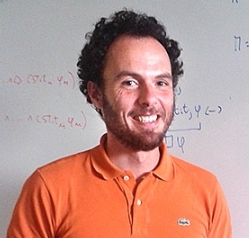Invited Speakers
Zoe Christoff (University of Groningen)
 Title: Majority illusions in social networks
Title: Majority illusions in social networks
Abstract: The popularity of an opinion in one’s direct circles is not necessarily a good indicator of its
popularity in one’s entire community. For instance, when confronted with a majority of opposing
opinions in one’s circles, one might get the impression that one belongs to a minority. From this
perspective, network structure makes local information about global properties of the group
potentially inaccurate. However, the way a social network is wired also determines what kind of
information distortion can actually occur. In this talk, I will discuss which classes of networks
allow for large groups of agents to have a wrong impression about the distribution of opinions in
the network. We focus on the case where agents are wrong about the majority opinion, that is,
they are under ‘majority illusion’, and generalize to other types of illusions. This is joint work with
Maaike Venema-Los and Davide Grossi.
Nicholas Asher (Centre National de Recherche Scientifique)
 Title: Investigating reasoning in language models
Title: Investigating reasoning in language models
Abstract: I am interested in inductive reasoning its capacities and limits. Large language models are a great laboratory for looking at such reasoning. In this talk I will investigate some problems with reasoning in LLMs, which emerge in particular from how LLMs encode the meanings of logical operators like negation.
Nico Potyka (Cardiff University)

Abstract: Logic and Argumentation are relevant in their own right for building Explainable AI solutions, but the wide-spread adoption of black-box machine-learning models opens up another use-case: explaining black-box models by reasoning about their structure, and their inputs and outputs. Recent years brought forward a variety of interesting ideas: using propositional reasoners to generate rule-based explanations, combining computer vision models with ontologies to explain classifications, approximating the knowledge of language models with Horn theories, and using argumentation to reason about the decision process of machine learning models or to resolve conflicts between competing predictions. In this talk, I will discuss the role of logical and argumentative approaches in Explainable AI, give a high-level introduction to some selected approaches, and discuss challenges and potentially interesting research directions for the CLAR community.
Emiliano Lorini (Toulouse University, CNRS)
 Title: Preferences in concurrent games
Title: Preferences in concurrent games
Abstract: I will provide a model-theoretic analysis of a new class of structures, called Concurrent Game Structures with Preferences (CGSP),
which represent both key aspects of agents' interaction in repeated games: the game form and their preferences over possible plays.
Furthermore, I will use these structures to interpret a new family of ATL languages that distinguish between strategic capability and
strategic rational capability. I will also present results on the complexity of satisfiability checking and model checking,
as well as proof-theoretic results for these languages.
Ryuta Arisaka (Kyoto University)
 Title: Argumentation and Logic: A Modern and Natural Connection
Title: Argumentation and Logic: A Modern and Natural Connection
Abstract: Formal argumentation, in the tradition of Dung's abstract argumentation, has studied the notion of acceptability semantics for argumentation represented as directed graphs. With each edge understood as an attack, many constraints are derived from node-to-node relations (or argument-to-argument relations) through attacks, each of which - by itself or in combination with others - contributes to the formulation of acceptability semantics. Broadly speaking, and to put it in formal logic terms, it is as if each node were a proposition and we had a truth-value assignment on them, the attacks acting like logical connectives. Unlike rigorous logic, however, argumentation permits fallacies and vague reasoning that - despite their problems - are still openly accepted by a significant portion of the community. While accepting fallacies is certainly a threat to our belief systems, dismissing them too early would amount to turning a blind eye to a propaganda-filled reality.
Thus, they need to be recognised as forming effective rhetoric in our life, which any model of argumentation that purports to capture real-world argumentation should be able to represent. But this raises a fundamental question. How do we accept something that ought not to be accepted? Or to put it in formal logic terms, how do we regard a proposition true if it ought not be true?
Context plays a key role in seeking the answer. In this talk, I will explore the various 'contexts' at play, identify conceptual correspondences between argumentation and logic grounded in them, and then talk about the concept of a hybrid argumentation model, revealing a modern and natural connection between them (and of course addressing the above question). With this model of argumentation at hand, I will discuss what fallacies formally are and identify their conceptual counterparts in formal logic, thus further cementing the understanding of the connection between formal argumentation and formal logic. I will also present technical discoveries from my work with the hybrid model for furthering logical investigations of argumentation, covering both algebraic and algorithmic concerns.
More invited speakers will be confirmed later